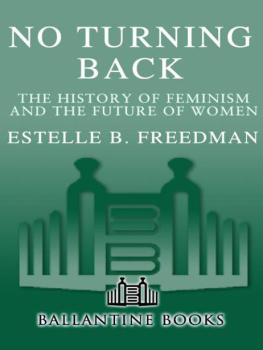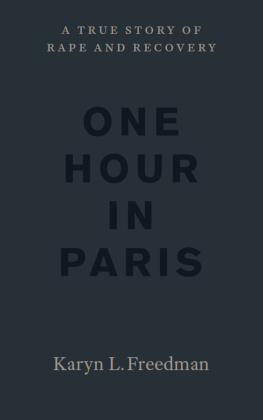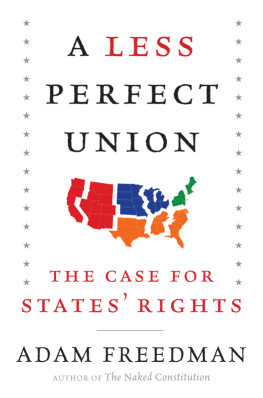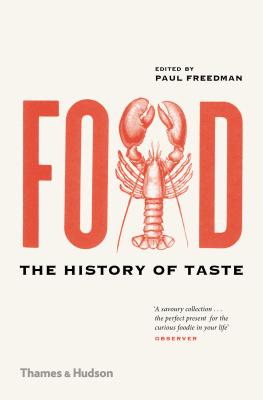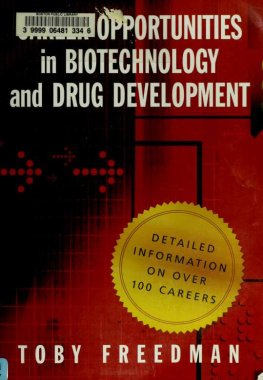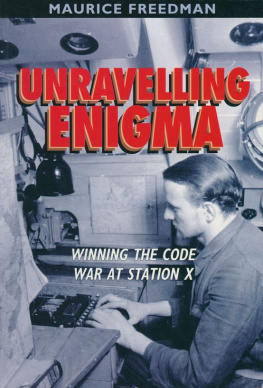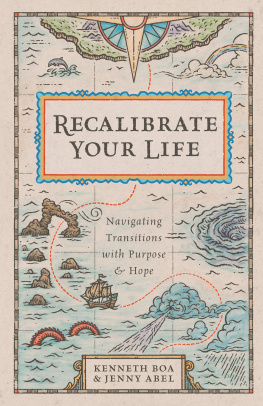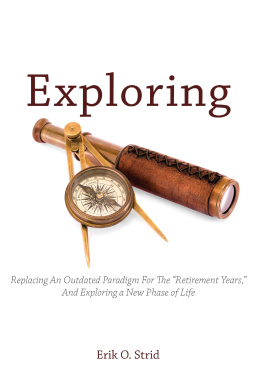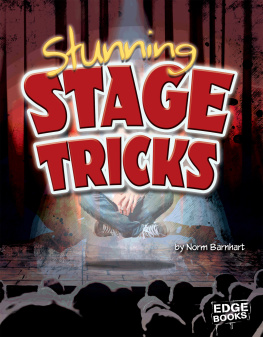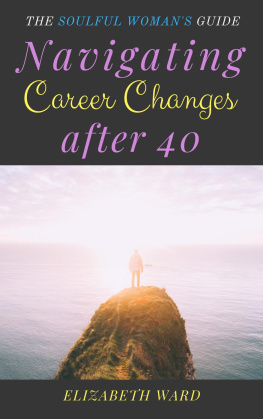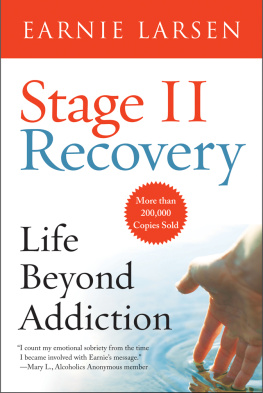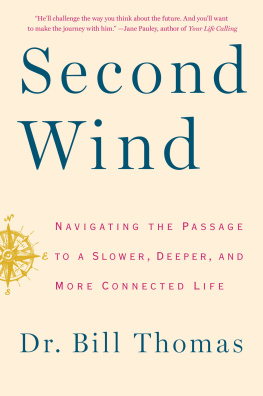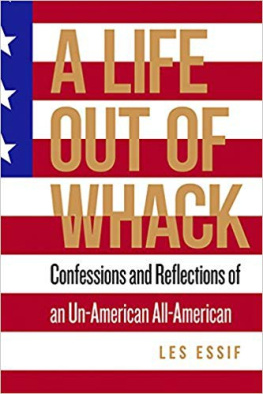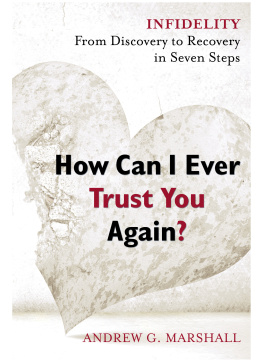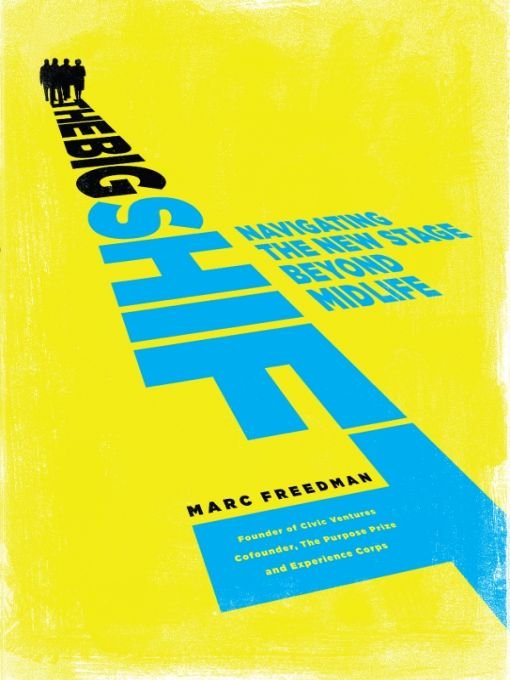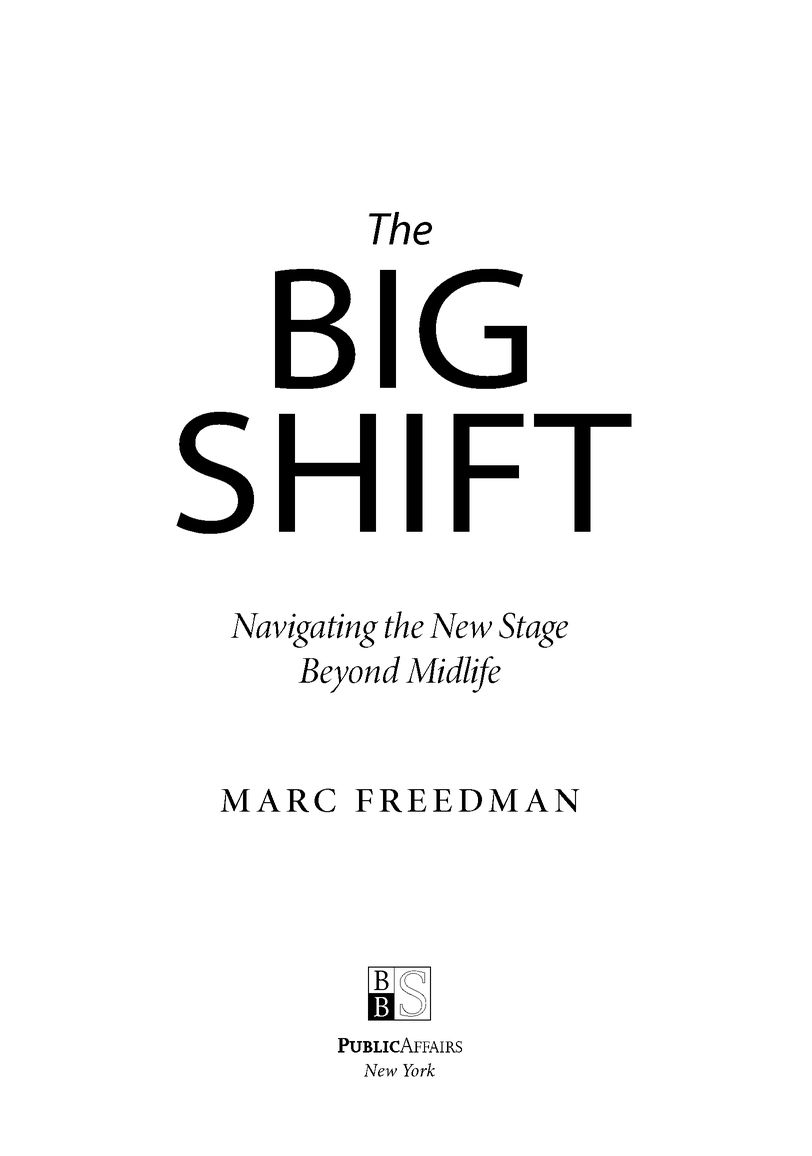Table of Contents
ALSO BY MARC FREEDMAN
Encore: Finding Work That
Matters in the Second Half of Life
Prime Time: How Baby Boomers Will
Revolutionize Retirement and Transform America
The Kindness of Strangers: Adult Mentors,
Urban Youth, and the New Voluntarism
FOR LESLIE,
with love and appreciation
FOR GABRIEL, LEVI, AND MICAH,
our own little generativity revolution
We rarely come to anything like a masterly grip till the shadows begin to slant eastward, and for a season, which varies greatly with individuals, our powers increase as the shadows lengthen.
G. STANLEY HALL,
Senescence: The Last Half of Life (1922)
ONE
An AARP Discountand Two Cribs
I turned fifty and decided to take a break. After twenty-five years of working, it seemed like a good idea. Honestly, I was feeling depleted. I still cared about my career and realized, amid a worsening economic climate, that I was lucky to have one. But that appreciation felt more lodged in my head than my heart.
One day, United Airlines sent me a card, along with some new luggage tags, offering congratulations on having flown 2 million miles. Quick arithmetic translated all those zeroes into the equivalent of flying from one side of the country to the other every single daySundays, holidays, birthdays, sick or wellfor more than two years. Maybe the card from United should have offered condolences. It all added up to an abiding fatigue. And a question: Did I want to fly 2 million more miles over the next twenty-five years of my life?
Was I having a low-grade midlife crisis? I had no red sports car, reckless affair, or other obvious sign something was amiss. Instead, there seemed to be internal bleedinga sense that the energy and optimism were ebbing out of me. My hope was that a three-month sabbatical would cure all that, bringing needed rest and clarity. After ten years of running the organization Id founded, I thought I might be able to arrange some combination of vacation and leave. My board, perhaps a little worried about me as well, was happy to oblige.
I resolved to get away, far away. Soon I was looking at hotel reservations in Australia, contemplating time in Southeast Asia, marking off several months in the calendar. I purchased plane tickets, for myself, my wife, and our kids. Then the reality set inthe cost, the time away, living out of a suitcase for weeks on end. It all sounded eerily like one more business trip. A down payment on the road to 3 million miles? Do they give you the actual luggage when you hit that milestone?
I canceled the Australian hotels. I called the airlines to say forget it. They informed me that not taking my trip would cost $1,000 in penalties. I contemplated returning my luggage tags in protest. Soon, however, to my surprise, liberation was replacing disappointment. The lightness reminded me of research findings suggesting one of lifes great joys was not taking a big vacation after the pleasures of anticipating one. Planning a trip, basking in the possibilities, experiencing the entire journey in ones mindthose were the fun parts. Lugging bags, dealing with surly employees, battling airport security, spending more money than budgeted, and eventually returning home exhausted and confronting a pile of mail and accumulated obligationsin other words, taking the actual vacationwere much less enjoyable. The perfect combination, at least according to this research, turns out to be planning fantastic adventures and then bailing out at the last minute.
Yet, research notwithstanding, I still wanted to get away and clear my head. My three-month sabbatical Down Under was downsized into a two-week car trip in a dented Prius up the Pacific Coast from San Francisco, where I live, to Oregon. After consulting the map and locating the midpoint for our journey, I got on the phone with the Homewood Suites in Medford, Oregon, to make reservations for our first stop en route to the Pacific Northwest. In the spirit of frugalityafter all, I was already out a thousand bucks before our trip had even startedI asked about discounts. The AAA rate knocked off 20 percent. Great. Then it dawned on me. I was fifty years old, after all. I had shelled out for the AARP card when prompted. What about the senior discount? It was the lowest rate. Book it, I told the twentysomething clerk, and hung up the phone triumphant. I was already beginning to envision the new trip, when I remembered my wifes injunction about requesting cribs for our two boys, ages one and three, part of the reason we werent checking in at the Sydney Marriott.
The same clerk answered again. Yes, I was the guy hed just talked to, with the senior discount. Id like to request two cribs in the room, I said. Yes, thats right, an AARP discount and two cribs. Was that the fraud alert beeping in the background? I know I heard something. I fully expected to be carded by the clerk upon check-in, perhaps flanked by local law enforcement.
HOMEWOOD BOUND
The Homewood Suites of Medford provided a memorable moment: Our one-year-old took his first steps on the hotel rooms recently laid carpet, as we followed him around with the video camera. The stay was significant in another way as well. In that moment on the phone with the reservation clerk, a series of truths about my quiet crisis became evident.
The odd combination of discounts and requestssigns of what once indicated distinct parts of the life cycle separated by decadesmade one thing abundantly clear and personal: The old map of life, which guided us for generations, was rapidly becoming an anachronism.
Until not long ago, the fifties and sixties meant retirement, grandparenthood, senior discounts, and early-bird specials. Possibly contemplating a retirement community free from school taxes and frequent visits by anyone under eighteen. Maybe even an end to working. My own father took the early-out package at fifty-seven, with 80 percent of his top salary guaranteed for life. Now twenty-three years into retirement, he has a decent shot at being retired for as long as he worked and earning more money for not working than he earned for getting up and going to the job each day. That wont be possibleor sustainablefor me.
By the time my dad was fifty, I had already graduated from college, and my sister was nearly done. By the time my third sonyes, we had another one since the tripis through college, I will likely be closing in on my eightieth birthday, my fathers age today. Like so many others, I delayed parenthood until my second marriage. Its a joy and I have no regrets, but I wonder how Ill wrestle with my kids without wrenching my back and how Ill pay college tuition in my seventies. I wonder what it will mean for my working life.
Theres also a question of identity. Whats the category for people like me? There are a growing number of us who can be classified as neither-nors. Neither young nor old. Neither retirees nor of traditional parenting age. Tired, perhaps, but neither ready to be retired nor able to afford it. The truth is, I will probably be working for another twenty-five years, the second half of my adult life.
Whats more, this isnt just about me or my boomer colleagues. New research suggests that children the age of my kids, growing up in the developed world, can reasonably expect to see their one hundredth birthdays. The odds of doing so, by some estimates, exceed 50 percent. In other words, those of us hitting fifty today are simply the first generation to inhabit an emerging lifecourse, one that is in flux but will be a permanent change, not a passing aberration.


